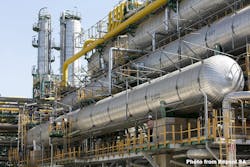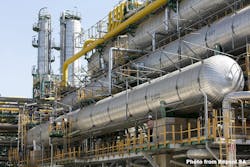Repsol launches Big Data, AI project at Tarragona refinery
Repsol SA is working with Google Cloud to launch a project that will use Big Data and artificial intelligence (AI) to optimize management of its 186,000-b/d Tarragona integrated refining complex in eastern Spain.
Part of Repsol’s commitment to digitalization, innovation, and technology across all its business areas, the initiative will involve Google’s delivery of its latest cloud technology to Tarragona’s operators to help the refinery maximize efficiency—both in energy consumption and consumption of other resources—and improve overall operational performance as well as competitiveness, Repsol said.
To achieve this, Google will provide Repsol with data and analytics products, the experience of its professional services consultants, and Google Cloud ML—its machine-learning managed service—to help Repsol’s developers build and bring machine-learning models to refinery production, the operator said.
“This is an efficiency project in all senses: it seeks to consume less resources; reduce energy consumption, which is the highest cost of a refinery; increase the unit reliability, and, by extension, improve economic performance,” said María Victoria Zingoni, Repsol’s executive managing director of downstream.
“This initiative belongs to a more comprehensive plan to take advantage of the possibilities afforded us by the latest in technology and improve industrial processes. We are not afraid of aiming for the stars, even if some projects will fail. This is about learning as fast as possible and that machines help people in their work,” Zingoni added.
The management of a refinery involves around 400 variables, which demands a high level of computational capacity and a vast amount of data control.
With the highest number of functions integrated digitally in an industrial plant to date at about 30 variables, the project aims to increase the number of variables managed by more than 10 times, said Repsol, which chose the Tarragona refinery to develop this initiative because the online configuration of the plant’s production schematics enables testing and implementation.
While Repsol did not disclose a specific timeframe for project implementation, the operator said the project has the potential to add 30¢ on the dollar to Repsol’s refined barrel margin, which could translate to $20 million/year for the Tarragona refinery, with major upward growth if all optimization objectives are achieved.
The Tarragona project aligns with other digital initiatives already in use at Repsol’s industrial sites, such as Siclos, with which Repsol’s refinery control-panel operators learn, in real time, the economic implications of operating decisions; or Nepxus, which increases planning, analysis, and agility in decision-making in the control rooms at these sites.
One of six Repsol-operated refineries in Spain and Peru, the Tarragona refinery occupies over 500 hectacres and includes 1 million cu m of storage tanks.
Contact Robert Brelsford at [email protected].

